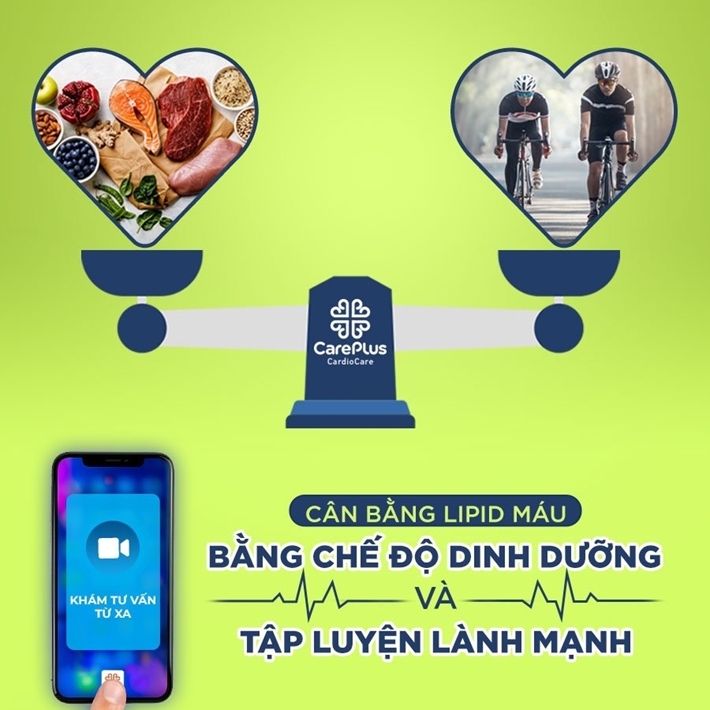Healthy diet and exercise for people with dyslipidemia
Cholesterol is a waxy fat found in the body and many foods. You need a certain amount of cholesterol for your cells to function correctly, but too much can turn into a health problem.

8/28/2021 10:03:39 AM
Another fat-soluble fat called Triglyceride also circulates in the blood. When cholesterol and triglycerides are elevated in the blood, hyperlipidemia is diagnosed, which is a condition that can affect heart health. Hyperlipidemia can lead to a harmful buildup of plaque in your arteries which can eventually cause heart attacks and strokes.
WHAT DOES A BLOOD TEST SAY?
Your doctor can check your blood lipid levels with a simple blood test. The results of the test will include information such as:
- Total cholesterol
For men and women 20 years of age and older, this should be between 125 and 200 mg/dL. For people under the age of 19, less than 170 mg/dL is considered healthy.
- LDL, or bad cholesterol
Everyone, regardless of age or gender, should keep this number under 100 mg/dL.
- HDL, or bad cholesterol
HDL helps remove bad cholesterol from your blood vessels. Men 20 and older should keep this level above 40 mg/dL, and women 20 and older should aim for 50 mg/dL or higher. Children should have a level of 45 mg/dL or higher.
- Zero-HDL Index
It is calculated by subtracting HDL from total cholesterol, thus reflecting LDL and several other types of cholesterol, including VLDL (very low-density lipoprotein). The non-HDL index represents the full content of little fats that quickly form atherosclerotic plaques. Men and women 20 years of age and older keep this number under 130 mg/dL. People under the age of 19 should try to keep this number below 120 mg/dL.
- Blood triglycerides
A triglyceride level below 150 mg/dL is considered normal regardless of age or sex. Ranges of 150 to 199 mg/dL and 200 to 499 mg/dL are considered high. The alarming high is above 500 mg/dL or more.
DIET FOR BLOOD LIPID CONTROL
Reducing consumption of saturated fat and sugar can help control hyperlipidemia.
- Choose foods of plant origin
Maintain a diet rich in whole grains, fruits, and vegetables.
- Get in the habit of reading food labels carefully.
A heart-healthy diet should include minimal amounts of saturated fat and sugary foods. Eat more fruits and vegetables, and choose low-fat or fat-free dairy products.
- Pay attention to calories
Especially for overweight people, the first thing you should do is reduce your calorie intake.
- Eat lots of fish and lean meat
If you want to eat meat, choose lean meats like lean poultry; Choose fish rich in Omega-3 like salmon, herring, or plant-based protein sources instead of red meat like pork, beef, etc.
- Increase fiber in the diet
Fiber helps to remove cholesterol from the body through the digestive tract. Choose whole grains like oatmeal, quinoa, brown rice, barley, and fruits and vegetables, including legumes, beans, avocados, Brussels sprouts, carrots, apricots, apple pears, or varieties another citrus.
- Avoid foods with high cholesterol.
Greasy, deep-fried, and processed foods tend to be high in cholesterol and bad fats, all of which can contribute to high blood lipids. Packaged baked goods and desserts can also be high in cholesterol.
- Say no to trans fats
Trans fat is an unhealthy fat commonly found in fast foods and industrially processed foods such as cookies, crackers, vegetable products, coffee ice cream, and other processed foods. If the label says "partially hydrogenated oil," it means the item contains trans fat.
- Choose unsaturated fat instead of saturated fat
Use olive oil instead of coconut oil for cooking. Other vegetable oils you can substitute in cooking, salad dressings, and baking include canola, grapeseed, avocado, safflower, and corn oils.
- Say no to sugar
Instead of drinking soda or sweetened tea, drink plain water and keep simple carbohydrates less than 10% of your daily calories.
- Eat nuts
It's a great way to replace saturated fat with unsaturated fat, add fiber and help you feel fuller for longer. Nuts like almonds and walnuts are good sources of healthy fats.
- Say no to alcohol
Reduce alcohol intake or avoid it at all to help lower blood lipid levels.
There is no one-size-fits-all diet, and what foods to eat for optimal health depends on whether the person has heart disease, diabetes, or digestive problems or not. Therefore, it is best to consult your doctor or nutritionist before deciding which diet is best for you.
DON'T FORGET TO EXERCISE REGULARLY
Besides improving your diet, exercise is one of the most effective lifestyle changes you can make to help control blood lipids naturally.
Why is exercise effective in lowering cholesterol?
Cholesterol is one of the fats circulating in the blood. If we have too much cholesterol, it can stick to the arteries, narrowing the arteries and increasing the risk of cardiovascular disease.
- Exercise helps increase levels of good cholesterol, HDL.
- Exercise can help lower cholesterol even if you're overweight.
Which 6 types of exercise are most effective?
Try to spend at least 30 minutes a day exercising. Any kind of exercise is better than no exercise at all. The following six types of exercise have been shown by studies to be effective in lowering cholesterol levels:
1. Jogging
2. Take a brisk walk
3. Cycling
4. Swimming
5. Lifting dumbbells
6. Yoga
All of these types of exercise help lower cholesterol and the risk of cardiovascular disease. You can choose which is best for you depending on your health condition and lifestyle.